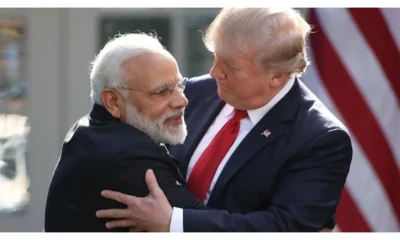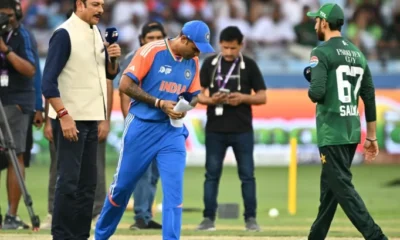The Supreme Court on Tuesday ruled that it cannot disqualify candidates with criminal cases against them from contesting elections and urged the Parliament to enact a law to ensure that people with serious criminal charges do not enter public life.
A five-judge Constitution bench, headed by Chief Justice of India Dipak Misra and also comprising Justices RF Nariman, AM Khanwilkar, DY Chandrachud and Indu Malhotra, said the time had come for a law against criminalisation of politics. The “nation eagerly waits for such legislation”.
The apex court said that the country was facing an increasing trend of criminalisation of politics and that it strikes at the very root of democracy.
The SC bench, however, issues directives to check criminalisation.
It directed that all candidates must state, in bold, details of criminal cases pending against them in their election affidavit. Candidates must also share this information with their respective political parties, which will in turn upload this on their websites.
Parties should also issue a declaration on the criminal antecedents of their candidates in a widely circulated publication, said the SC bench. It said this should be done at least three times after filing of nomination papers.
To facilitate this transparency by parties, candidates should first give complete information about their criminal past or pending cases to the parties on whose ticket they intend to contest elections, stated the judgment.
This is to ensure that the ordinary voter can have an “informed choice” about who (s)he has to vote for in a country “tired of money and muscle power,” said the court.
The direction to compel political parties to go public about their “criminal” candidates is a step to “foster and nurture an informed citizenry” and to protect the “culture and purity in politics.”
The court said criminal politicians are nothing but a liability to this country. Their presence in power strikes at the roots of democracy. Criminalisation of politics and corruption, especially at the entry level of elections, has become a national and economic terror. It is a disease which is self-destructive and becoming immune to antibiotics, opined the court.
“There is a steady increase in the level of criminality creeping into politics,” the court observed. Parties need to come clean about the criminal elements within their apparatus.
Chief Justice Misra, who authored the verdict for the Bench, directed “each contesting candidate,” whether he or she belongs to a party or not, to fill up all the required information in the forms to be submitted to the Election Commission of India before an election.
The Bench, however, made it clear that the Supreme Court cannot legislate for Parliament and add a disqualification that candidates charged with heinous crimes should be banned from contesting elections.
The chief justice added that the court was “not in a position to add disqualification of candidates on filing of chargesheet in criminal cases.”
The Court urged Parliament to consider such a disqualification, saying the nation eagerly awaits its decision. It noted that the Election Commission of India has its hands tied, watching on as criminalisation of politics at the entry level is on the rise.
“It is the duty of parliament to keep money and muzzle power at bay. Parliament should cure the malignancy and it is not incurable before it becomes fatal to democracy,” Chief Justice of India Dipak Misra said.
The SC said “time has come for the Parliament to act” and empower the poll body. “The court declares the law, the Parliament makes the law,” Justice Nariman had observed.
Chief Justice Misra had pointed out that Parliament was obliged under Article 102 (1) (e) to make a law. “As conscience-keepers of the Constitution, we [Supreme Court] can ask you [Parliament] to do it,” he stated.
False cases foisted upon politicians
During arguments, Attorney General KK Venugopal, representing the centre, had said that denying a person the right to contest polls on a party ticket would amount to denying them the right to vote, which includes the right to contest. “Mere allegation cannot prevent a member from contesting.”
The court, he asserted, can’t remain oblivious of the fact that political aspirants are often framed in cases ahead of polls and said that fast-track courts to try accused politicians were “the only solution”.
The petitioners pointed out that trials in cases involving politicians were deliberately delayed, and therefore, several lawbreakers entered the legislature and become lawmakers.
Chief Justice Dipak Misra said, “It is one thing to take cover under the presumption of innocence, but it is another to allow politics to be smeared by criminal stain.” The court said Parliament should also consider the issue of false cases foisted upon politicians.
Under the Representation of the People Act, convicted lawmakers are disqualified from contesting elections, but not accused ones.
The bench was hearing a batch of petitions seeking disqualification of chargesheeted lawmakers from contesting elections. The petitions were filed by NGO Public Interest Foundation and Delhi BJP leader Ashwini Kumar Upadhyay. The bench had reserved its verdict in the case on August 28.
In an affidavit submitted to the Supreme Court in March this year, the Centre said a total of 3,816 criminal cases were registered against 1,765 MPs and MLAs across the country, of which 3,045 cases are pending. The figures did not include cases registered in Maharashtra and Goa. Uttar Pradesh leads the pack with 565 cases against 248 MPs and MLAs, followed by Kerala with 533 cases against 114 legislators. Tamil Nadu is third on the list with 402 cases against 178 MPs and MLAs, of which 324 are pending.


 Latest world news13 hours ago
Latest world news13 hours ago
 India News13 hours ago
India News13 hours ago
 India News13 hours ago
India News13 hours ago
 India News13 hours ago
India News13 hours ago
 LATEST SPORTS NEWS13 hours ago
LATEST SPORTS NEWS13 hours ago
 India News9 hours ago
India News9 hours ago
 India News5 hours ago
India News5 hours ago
 India News5 hours ago
India News5 hours ago











